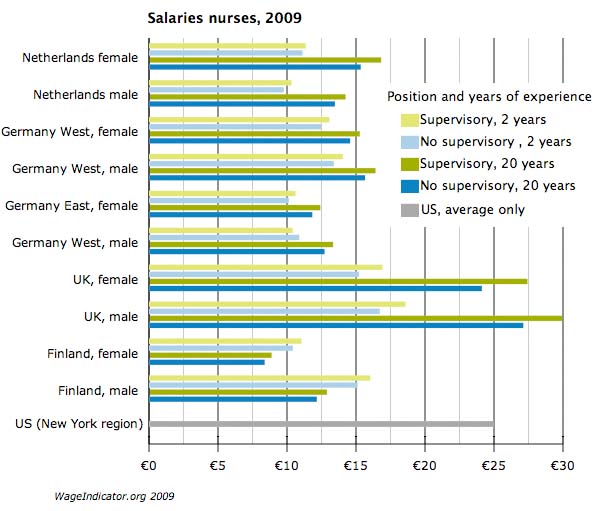Having a supervisory position does not bring nurses much financial gains, shows a comparison of their salaries. Experiences mostly does have an impact on their pay, just like their location: UK and the US pay best. Apart from Finland, the gender gap was mild compared to other occupations.
After comparing salaries of PR-managers, economists and truck drivers, we turn today to the health care, nurses in hospitals. We compared differences between gender, experience and those who had a supervisory position or not. Other criteria we did not compare. We assumed that most hospital nurses would work in organization larger than 500 people and that they would have no university degree, but would still have a decent education, so those criteria seemed less relevant.
Supervision job does not pay
Most remarkable was the lack of compensation for nurses in a supervisory role. The question is a standard one in all salary surveys of the WageIndicator in 45 countries, because we think that a higher responsibility often comes with a higher salary. Well, not for nurses. In almost all investigated countries the difference between nurses with or without a supervisory position remains well below one euro per hour, with the exception of the UK where nurses with 20 years of experience earn three euro more, compared to those with two years experience. But because their salary is the highest of all with 30.15 euro per hour, the difference with those without supervisory tasks is still only 10 percent.
Only Europe
Unfortunately, we could only get valid figures from European countries and the average salary in the US as benchmark. One of the reason might be that in Europe this occupation is highly regulated and needs a rather thorough education. In many developing countries, the occupation is much seen as an extension of regular family care, while the demand for professional nurses might be lower as a part of the population. At least, not enough filled in our survey outside Europe. An illustration could be found in East-Germany, where unlike other European countries and regions, experience was not so much valued. Between nurses with two years of experience and those who are twenty years on the job, salary differences can vary from 30 percent till sometimes of 50 percent in the rest of Europe. In East-Germany the difference mostly sticked around 20 percent or less. Only Finland went further than East-Germany: here the more experienced nurses earned less compared to the new ones.
No gender gap
One remarkable feature is that the difference between pay for men and women is in most cases marginal and in the Netherlands women nurses earn slight better than their male colleagues. Finland is the only exception, were we find a firm difference in the advantage of men - up to 50 percent. One explanation could be that the number of male nurses is relatively small compared to the women and that could make this result less conclusive. as is often the case in occupations that are dominated by one gender.
Location
Moving to the UK seems still the best option, if possible, since nurses earn much more than on the mainland and even match the average salaries in the US (New York region) of 24.98 euro per hour in 2008.
Look also at a 2008 publication by the WageIndicator's Kimmo Kevatsalo on Finnish nurses here. Its key conclusions supports also our findings. From the report: "The comparison of salaries proved that salaries after taxes and their purchasing power was lowest in Finland. Purchasing power was half of the UK nurses, whose salaries were highest within the compared countries. This result got a large interest in the media and was one of the arguments which the Finnish nurses’ trade union, Tehy, used when preparing its industrial actions in 2007."

Please note that these figures were collected in June 2009 according to very specific profiles of economists. For your own salary, please visit the WageIndicator of your country.
You can follow the WageIndicator not only on its site and through an rss-feed, but also on twitter (@wageindicator), and at special groups at Facebook, LinkedIn , Friendfeed and through this Google group, including mailing list.
